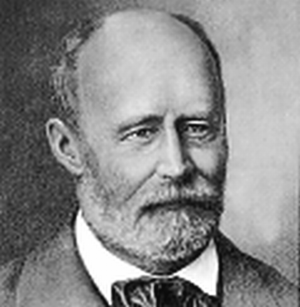Paul de Lagarde facts for kids
Quick facts for kids
Paul de Lagarde
|
|
|---|---|

Paul Anton de Lagarde
|
|
| Born | 2 November 1827 Berlin, Prussia
|
| Died | 22 December 1891 (aged 64) |
| Other names | Paul Bötticher |
| Occupation | Orientalist |
Paul Anton de Lagarde (born November 2, 1827 – died December 22, 1891) was a German expert in ancient languages and the Bible. He is sometimes seen as one of the most important scholars of Eastern cultures in the 1800s. However, Lagarde also held strong, negative views against certain groups of people. He was against Christianity and supported ideas that later influenced very harmful political movements.
He was a very smart and learned person. But he was also very set in his ways and didn't trust what others did. In politics, he was part of the Conservative party in Prussia. He passed away in Göttingen in 1891.
Contents
Early Life and Education
Paul Anton de Lagarde was born in Berlin. His birth name was Paul Bötticher. When he became an adult, he changed his last name to Lagarde. He did this to honor his great-aunt, who had raised him.
He studied at two universities: Humboldt University of Berlin (from 1844 to 1846) and University of Halle-Wittenberg (from 1846 to 1847). There, he learned about religion, philosophy, and languages from the Middle East. In 1852, he traveled to London and Paris to continue his studies.
His Work as a Professor
In 1854, Paul Anton de Lagarde started teaching at a public school in Berlin. Even though he was teaching, he kept studying the Bible. In 1866, he took three years off to gather new information for his research.
Then, in 1869, he became a professor at the University of Göttingen. He took over from another famous scholar, Heinrich Ewald. Like Ewald, Lagarde worked on many different subjects and languages. His main goal was to understand the Bible better. He was known as the best expert on the Septuagint (an ancient Greek version of the Old Testament) in his time. He also worked hard on studying Eastern cultures.
His Controversial Ideas
Besides his university work, Lagarde tried to create a new German national religion. This idea included strong negative feelings towards Jewish people and Slavic people (like Poles or Russians). He also wanted Germany to expand its territory.
He didn't have many clear religious beliefs for this new national religion. He wrote that the government's most important job was to create a place where a national religion could grow. He believed that Germans should always feel responsible for their country's future.
A historian named Ulrich Sieg said that Lagarde "disliked Christianity" and hoped for a "folkish religion of the future." This means he wanted a religion based on German ethnic identity. Lagarde was interested in groups that shared his negative views. He believed that Jewish people were a big problem for German unity. He also thought Germany should take over and settle lands in Eastern Europe.
Lagarde's ideas also played a part in German expansionist thinking. He focused on Germany taking over land within Europe, rather than getting colonies overseas. He thought Germany should gradually make Poland more German. He wanted to create a large "Middle Europe" under German control. This area would stretch from the Ems River to the Danube River, and from the Neman River to Trieste.
Later, a leader named Tomáš Masaryk saw Lagarde as one of the main thinkers behind "Pan-Germanism." This was an idea that all German-speaking people should be united under one powerful German state. Masaryk believed Lagarde's ideas, along with others, supported Germany's push to expand eastward. This expansion threatened Slavic countries.
Lasting Impact
Lagarde's negative views on certain groups helped lay the groundwork for parts of the National Socialist ideology. This was a very harmful political movement that rose to power in Germany later on. His large collection of books is now kept at New York University.
Works
Paul Anton de Lagarde edited many ancient texts. He worked on texts in Syriac, Aramaic, Arabic, and Coptic. He edited the Didascalia apostolorum syriace (1854) and other Syriac writings. He also worked on the Aramaic translation of the Prophets, called Prophetae chaldaice (1872). He published an Arabic translation of the Gospels in 1864.
He also studied the history of the Armenians, writing Zur Urgeschichte der Armenier (1854). He was also a student of Persian, publishing Isaias persice (1883). He tried to put together a Syriac version of a text by Epiphanius, called On Weights and Measures (1880). He wrote many smaller articles about Eastern languages in various collections. One important work was Onomastica sacra (1870).
In his book Deutsche Schriften (1878–81), he shared his political ideas. This book talked about how the German government should relate to religion and the church. It became an important text for German nationalists.
 | Aurelia Browder |
 | Nannie Helen Burroughs |
 | Michelle Alexander |

